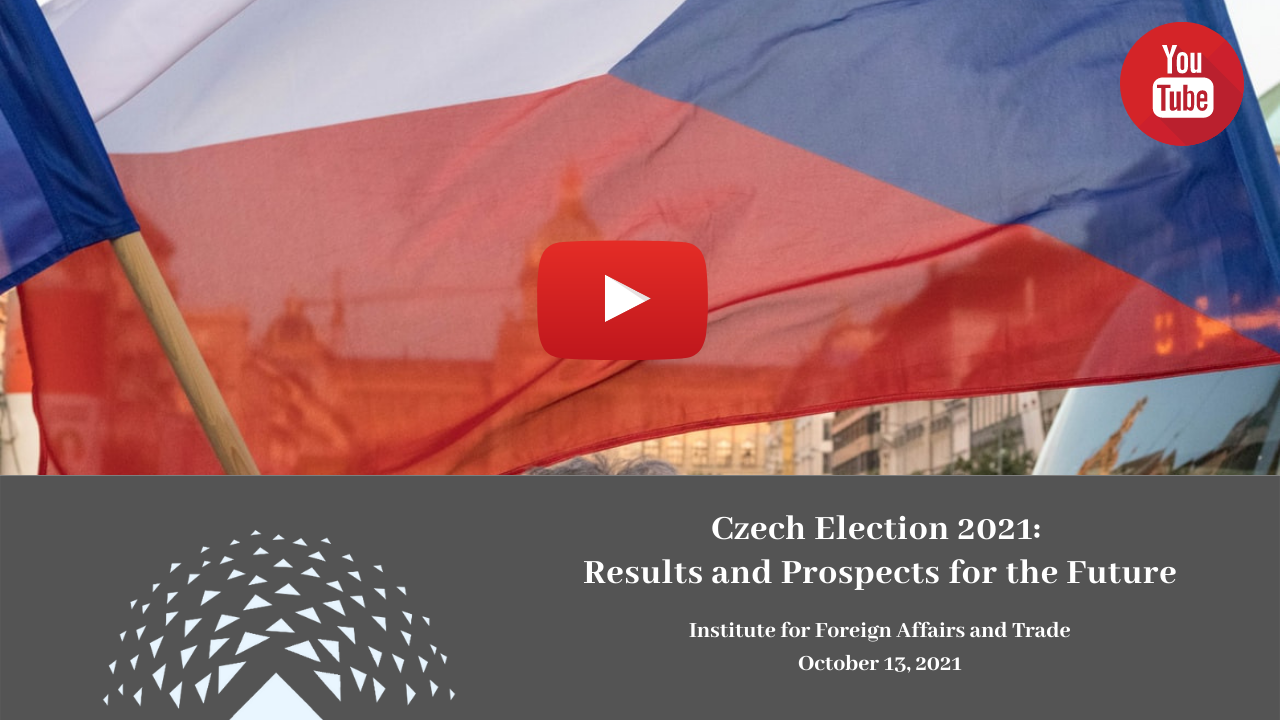The Institute for Foreign Affairs and Trade (IFAT) held an online roundtable discussion with the title of ‘Czech Election 2021: Results and Prospects for the Future‘ on the 13th of October 2021. Pavel Havlíček from the Association for International Affairs (AMO) Research Center, Vít Havelka from the EUROPEUM Institute for European Policy, and Nikolett Garai from the Institute for Foreign Affairs and Trade discussed the results of the Czech parliamentary elections which took place on 8-9 October 2021. The event was moderated by Tamás Levente Molnár from IFAT.
The experts started the panel by discussing the most unexpected aspects of the election. Vít Havelka argued that for him the biggest surprise was that the opposition forces were able to won the election by joining forces against Andrej Babis’ ANO 2011 movement. The centre-right coalition of SPOLU which includes the Civic Democratic Party (ODS), the Christian and Democratic Union – Czechoslovak People’s Party (KDU-ČSL), and the TOP09 received the most votes, while ANO 2011 came second. The historical defeat of the Czech leftist parties like the Czech Social Democratic Party (ČSSD) and the Communist Party of Bohemia and Moravia (KSČM) was mentioned by Pavel Havlíček as one of the most interesting results of the election. Neither of those traditional parties managed to enter the lower house, while the progressive alliance of the Czech Pirate Party (Piráti) and the Mayors and Independents (STAN) became the third most popular political force. Nikolett Garai highlighted that the STAN party gained a surprisingly big amount of seats (32) compared to its coalition partner, the Pirates (4) considering that in the previous parliamentary cycle the Pirates were much stronger. She also added that the election was a very close call between SPOLU and ANO 2011, only around 36 000 votes was the difference.
During the event, experts discussed the reasons why SPOLU was able to beat Babiš, they made their bets regarding which parties can form a possible coalition government, and explained the role of President Miloš Zeman in the government formation process. They also touched upon the possible foreign policy orientation of the next Czech government in case the two coalitions, SPOLU and PiratiSTAN will form a government. Research fellows debated the future of the Czech-Hungarian bilateral relations, the Visegrad Cooperation and tried to forecast the next government’s EU and security policy.
For the full recording please click on the link below or visit our YouTube-channel!
JTNDaWZyYW1lJTIwd2lkdGglM0QlMjIxMDAlMjUlMjIlMjBoZWlnaHQlM0QlMjI0NTAlMjIlMjBzcmMlM0QlMjJodHRwcyUzQSUyRiUyRnd3dy55b3V0dWJlLmNvbSUyRmVtYmVkJTJGU0FTaERWeUdTcEUlMjIlMjB0aXRsZSUzRCUyMllvdVR1YmUlMjB2aWRlbyUyMHBsYXllciUyMiUyMGZyYW1lYm9yZGVyJTNEJTIyMCUyMiUyMGFsbG93JTNEJTIyYWNjZWxlcm9tZXRlciUzQiUyMGF1dG9wbGF5JTNCJTIwY2xpcGJvYXJkLXdyaXRlJTNCJTIwZW5jcnlwdGVkLW1lZGlhJTNCJTIwZ3lyb3Njb3BlJTNCJTIwcGljdHVyZS1pbi1waWN0dXJlJTIyJTIwYWxsb3dmdWxsc2NyZWVuJTNFJTNDJTJGaWZyYW1lJTNF

